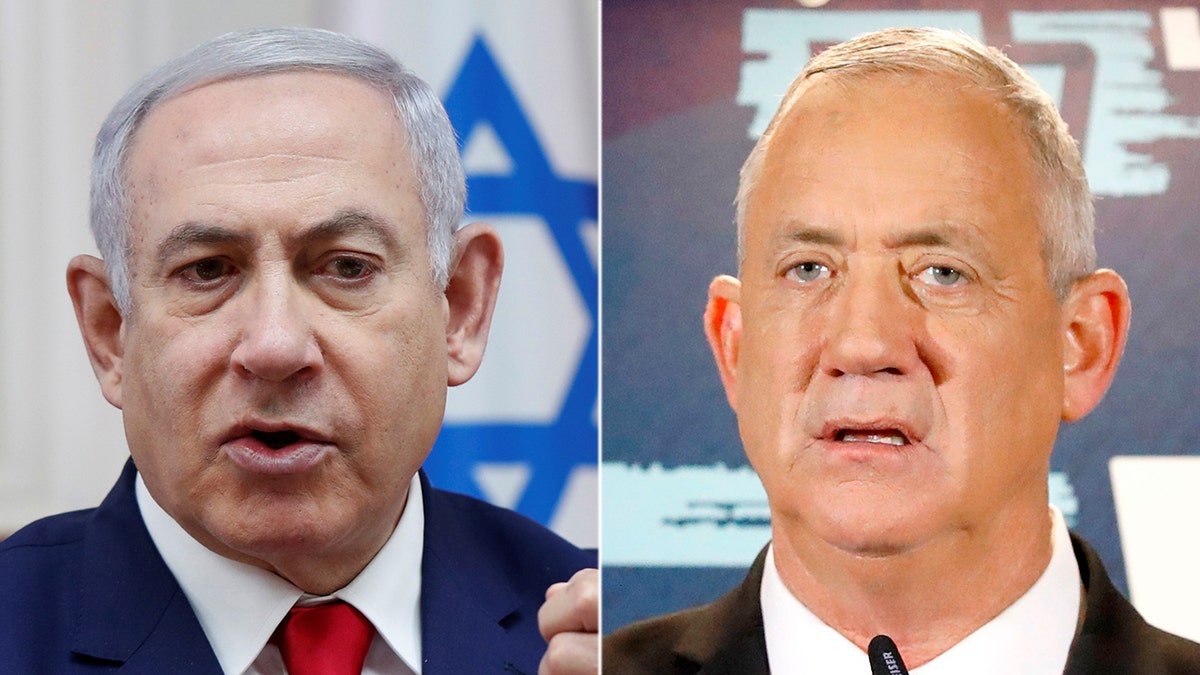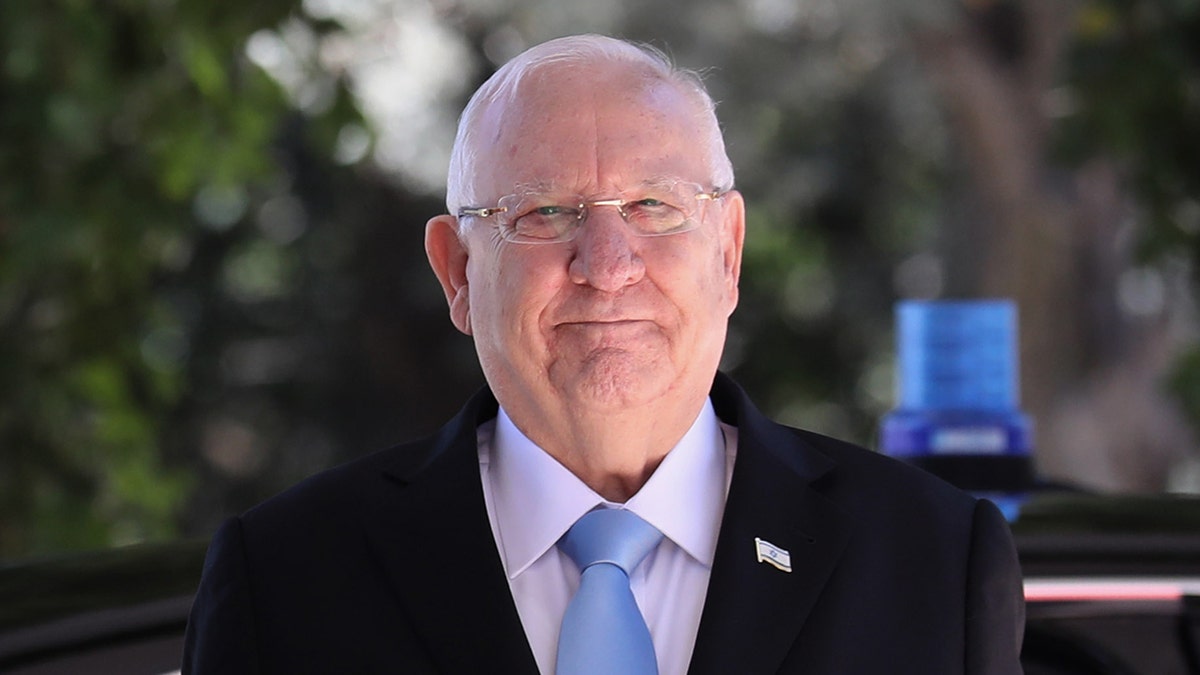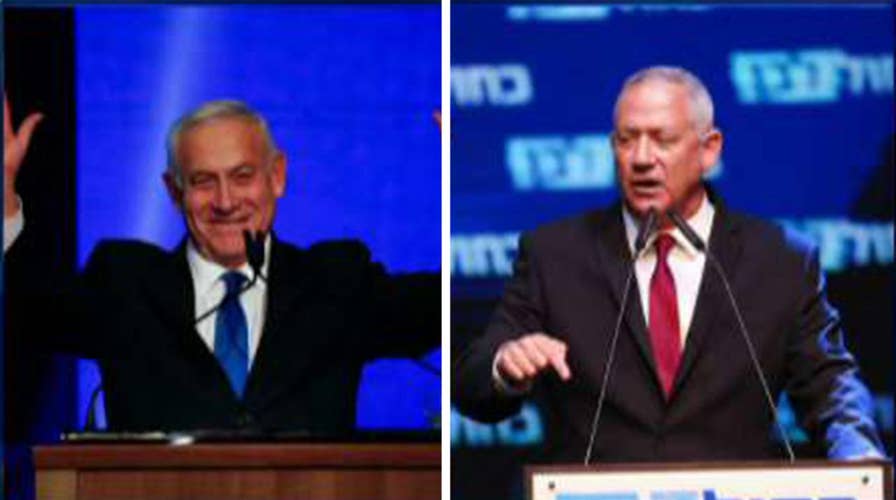Israel, Netanyahu in limbo after inconclusive election
No clear winner in Israel's general election; Trey Yingst reports from Jerusalem.
Israeli Prime Minister Benjamin Netanyahu's direct rival, Benny Gantz, rejected the leader’s appeal to form a unity government on Thursday as the country’s two main political parties remained deadlocked at the end of an unprecedented second election and the prospect of a third one loomed.
Netanyahu’s conservative Likud party and challenger Gantz’s centrist Blue and White party failed to win enough votes in the repeat election to form a coalition government of at least 61 seats in Israel’s 120-seat Parliament.
With nearly all votes counted Thursday, Likud stood at 31 seats and Blue and White held 33.
On Thursday Netanyahu called on Gantz, a former military chief, to join a government that includes the parties in the right-wing religious bloc, and pressured him to drop his demand for a secular unity government with Likud, The Times of Israel reported.
NETANYAHU APPEALS TO DIRECT RIVAL TO FORM UNITY GOVERNMENT AS PROSPECT OF THIRD ELECTION LOOMS
Netanyahu’s request reportedly came after the leaders of all those parties signed a document on Thursday morning, pledging to recommend Netanyahu as the next prime minister and vowed to enter a coalition only as a single unit.
"Throughout the campaign, I called for a right-wing government, but unfortunately the election results show that's not possible," Netanyahu said in a Hebrew video statement Thursday.
"Therefore there is no choice but to form a broad unity government."
Netanyahu, the longest-serving leader in Israeli history, then spoke directly to Gantz in the video: “Benny, we need to put in place a broad unity government today. The nation expects from both of us to act responsibly and to cooperate. So I am calling on you Benny, let’s meet today, at any hour, at any time in order to move this process forward.”
He added: "We cannot and there is no reason to go to third elections. I am against this."

Netanyahu’s conservative Likud party and challenger Gantz’s centrist Blue and White party failed to win enough votes in the repeat election to form a coalition government of at least 61 seats in Israel’s 120-seat parliament. (Getty)
Later on Thursday, Gantz reportedly dismissed Netanyahu’s offer of a unity government that includes all the religious right-wing parties and insisted that he should lead the next coalition. Gantz also stressed his commitment to liberal policies on religious issues, according to The Times of Israel.
Gantz reportedly said at a political faction meeting on Thursday, “The nation went to the ballots and made a clear choice — the nation chose unity. Blue and White won the elections, Blue and White is the biggest party. I intend to form a broad unity government headed by me, which would reflect the people’s choice and our basic promises to the public and our priorities.”
“We won’t succumb to any imposition. To form a unity government, one doesn’t come with political blocs and spin but with seriousness and responsibility,” Gantz reportedly added.
ISRAELI EXIT POLLS SHOW NETANYAHU SHORT OF MAJORITY IN YEAR'S SECOND ELECTION
Neither party will be able to form a majority without support from Avigdor Liberman, of the nationalist Yisrael Beitenu party. His insistence on a secular government would force out Netanyahu's traditional allies, the country's two ultra-Orthodox parties, and another nationalist-religious party.
The Blue and White party has repeatedly ruled out sitting in a government under Netanyahu, who, in the coming months, may face indictment in a slew of corruption scandals that include allegations of bribery, breach of trust and fraud. His political opponents warned that if Netanyahu is named prime minister again, he will use the position to secure himself immunity from prosecution, The Times of Israel reported.
After Gantz rejected Netanyahu’s offer of a unity government with the religious right, the prime minister said he was “surprised and disappointed,” according to the newspaper.
“The president called for unity, and without a meeting between the leaders of the two biggest parties a unity government cannot be formed,” Netanyahu reportedly in a statement, adding that his offer to meet with Gantz stands.

Israel’s president Reuven Rivlin, who has until October 2 to task a lawmaker with forming a government, will begin consultations with the newly-elected Knesset groups on Sunday, his office reportedly announced Thursday. (GALI TIBBON/AFP/Getty Images)
Israel’s president Reuven Rivlin, who has until Oct. 2 to task a lawmaker with forming a government, will begin consultations with the newly-elected Knesset [Israeli Parliament] groups on Sunday, his office reportedly announced Thursday.
Rivlin’s choice will have up to six weeks to assemble a government and if that person fails, the president can appoint another candidate, who will get up to four weeks.
CLICK HERE FOR THE FOX NEWS APP
Fox News’ Stephen Sorace and The Associated Press contributed to this report.









































